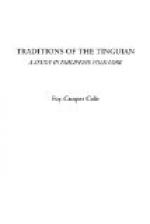“My wife,” said Kaboniyan, “give me the coconut oil, that I oil my spear, for I go to see those Ipogau who are sick.” When those Ipogau who were sick were in their house, his spear fell in their house. “What is the matter with you, Ipogau?” said Kaboniyan. “What is the matter with you, you say, and there is nothing which we do not do for our sickness, and we are never cured,” said those Ipogau. And Kaboniyan answered, “How can you become cured of your sickness when you have a bad sign for that which you made—your house? The reason of your sickness is because you do not make Sangasang. The good way (is) you find a rooster, and that you command the one who knows how to make diam of the Sangasang to make Sangasang. I (am) always the one for whom you make diam,” said Kaboniyan. And truly, before they had finished making Sangasang, it was as if there had been nothing wrong, that family was cured of their sickness.
39 [327]
The poles of the Ipogau’s house were quarreling. Said the floor supports to the poles who were quarreling, “What can you do if I am not?” “What can you do if I am not?” said the foot-boards to those floor supports who are quarreling. “What can you do if I am not?” said the cross supports to those floor supports who are quarreling. “What can you do if I am not?” said the cross supports to those foot-boards who are quarreling. “What can you do if I am not?” said the floor to those cross supports who are quarreling. “What can you do if I am not?” said the wall to the floor boards who are quarreling. “What can you do if I am not?” said the beams to the wall boards who are quarreling. “What can you do if I am not?” said the pongo [328] to the beams who are quarreling. “What can you do if I am not?” said the daplat [329] to the pongo who are quarreling. “What can you do if I am not?” said the end pole to those daplat who are quarreling. “What can you do if I am not?” said the salabawan to those end poles who are quarreling. “What can you do if I am not—who am legpet?” said those legpet to those salabawan, “Though you are legpet, you can do nothing if I am not,” said the gakot, “because you fall,” said the gakot to the legpet who are quarreling. “And what can you all do if I am not, who am grass? you all decay if I am not,” said the grass (roof) to those who are quarreling. “Therefore we are all the same use to the house of the Ipogau; we will unite our thoughts and breath, so that in the same manner the thoughts of the Ipogau are united, who live in us,” said those who are quarreling. And they united their thoughts and breath. After that the Ipogau who were sick were cured, those who lived in the house. It was as if there was nothing bad for that family.
40 [330]




